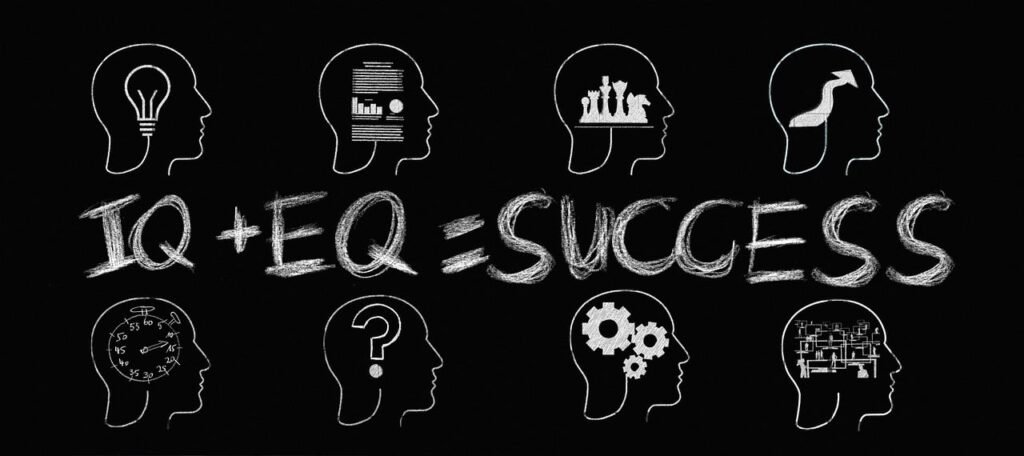
Intro
In a world where interpersonal connections can define our personal and professional success, the importance of emotional intelligence cannot be overstated. The emotionally intelligent man embodies a deep understanding of his own emotions and the emotions of others, enabling him to navigate life’s challenges with grace and insight. But what exactly makes an emotionally intelligent man stand out? This exploration will uncover essential habits that not only enhance emotional intelligence but also improve relationships and overall well-being.
Understanding the Core Components of Emotional Intelligence

Emotional intelligence is built upon a foundation of five key components: self-awareness, self-regulation, empathy, social skills, and motivation.
These elements serve as the pillars that support an emotionally intelligent man in his daily interactions and decision-making processes.
Self-awareness is the ability to understand one’s own emotions and how they influence thoughts and behaviors.
It’s about recognizing emotional triggers and understanding the impact they have on your actions.
This knowledge allows for more intentional responses rather than reactive ones.
Self-regulation is the practice of controlling one’s emotional reactions, particularly in stressful situations.
It involves staying composed, thinking before acting, and adapting to changing circumstances. Techniques like mindfulness and cognitive reframing are invaluable here.
Empathy, on the other hand, is the capacity to put oneself in another’s shoes.
It goes beyond mere sympathy, enabling a deeper connection with others.
By truly understanding and sharing the feelings of another, an emotionally intelligent man fosters stronger, more genuine relationships.
Social skills encompass the abilities to communicate effectively, manage conflicts, and inspire cooperation.
They are essential for building rapport and maintaining healthy interactions.
Effective communication is more than just talking; it involves listening, understanding non-verbal cues, and responding appropriately.
Finally, motivation refers to the drive that propels an individual towards achieving their goals.
Unlike extrinsic motivators like rewards or recognition, intrinsic motivation is fueled by internal desires for personal growth and fulfillment.
This kind of motivation not only enhances performance but also sustains long-term commitment to self-improvement.
By integrating these components into daily life, an emotionally intelligent man equips himself with the tools necessary for navigating the complexities of human relationships and personal challenges.
Practicing Self-Awareness and Reflective Thinking

An emotionally intelligent man dedicates time to self-awareness and reflective thinking, recognizing these practices as essential to personal and relational success.
Regular self-assessment, through tools like journaling or meditative reflection, offers insight into emotional patterns and triggers.
By examining his emotions and their impact on behavior, he can identify areas for growth and make decisions that align with his core values.
Reflective thinking allows him to dissect past interactions and outcomes, providing a clearer understanding of his emotional landscape.
This heightened awareness enables more intentional actions and responses, reducing impulsivity and fostering thoughtful engagement.
Additionally, self-awareness enhances his ability to communicate effectively, as understanding his own emotions makes it easier to articulate thoughts and feelings to others.
The practice of self-awareness also involves questioning assumptions and biases.
By challenging internal narratives and seeking a deeper understanding of his reactions, an emotionally intelligent man fosters a mindset of continuous learning and adaptability.
This proactive approach to emotional intelligence ensures that he remains attuned to his evolving emotional state, which is crucial for maintaining healthy relationships and navigating life’s challenges.
Incorporating mindfulness exercises can further enhance self-awareness.
Techniques like deep breathing and mindful observation help ground him in the present moment, offering clarity and reducing emotional reactivity.
These practices build a resilient emotional foundation, equipping him to handle stress with composure and grace.
By integrating self-awareness and reflective thinking into daily routines, he cultivates a richer, more nuanced understanding of himself and his interactions with others.
This ongoing process not only enriches his emotional intelligence but also lays the groundwork for more meaningful and authentic relationships.
Developing Effective Self-Regulation Techniques

Effective self-regulation is a cornerstone of emotional intelligence. Emotionally intelligent men employ various techniques to manage their emotional responses, especially in high-pressure situations.
Deep breathing exercises, for instance, can help reset the nervous system, promoting a state of calm and clarity.
Mindfulness practices, such as body scans or focused attention exercises, enhance present-moment awareness and reduce the likelihood of emotional overwhelm.
Cognitive reframing is another powerful tool.
This involves reinterpreting a challenging situation in a more positive or neutral light.
By shifting perspective, emotionally intelligent men can mitigate the intensity of negative emotions and respond more constructively.
This mental agility not only enhances emotional well-being but also fosters a balanced approach to problem-solving.
An essential aspect of self-regulation is learning to pause before reacting.
Taking a moment to breathe, count, or even step away temporarily can prevent impulsive reactions and enable thoughtful responses.
This deliberate pause creates space for assessing the situation objectively, leading to more effective and composed actions.
Additionally, establishing healthy routines plays a crucial role.
Regular exercise, sufficient sleep, and balanced nutrition all contribute to a stable emotional baseline.
When the body is well-cared for, it is easier to manage stress and maintain emotional equilibrium.
Emotionally intelligent men also set clear boundaries to protect their mental space.
By knowing when to say no and recognizing their limits, they avoid overcommitment and burnout.
This proactive approach to self-care ensures they remain resilient and focused, even in demanding circumstances.
In essence, the ability to regulate emotions effectively involves a combination of mindfulness, cognitive strategies, and self-care practices.
By integrating these techniques into daily life, emotionally intelligent men cultivate a stable, composed presence that benefits both personal and professional interactions.
Cultivating Empathy and Active Listening Skills

Empathy is a cornerstone of emotional intelligence, crucial for forming meaningful connections.
An emotionally intelligent man harnesses the power of active listening to truly understand those around him.
This involves more than just hearing words; it means paying attention to tone, body language, and emotional undertones.
By giving his full attention, he validates the speaker’s feelings and fosters a sense of trust and openness.
To enhance empathy, it’s essential to approach conversations with an open mind, free from judgments and preconceived notions.
This enables a deeper connection and shows genuine interest in the other person’s experience.
Asking open-ended questions can further this understanding, allowing the speaker to share more about their thoughts and feelings.
In practice, active listening requires patience and the ability to resist the urge to interrupt or offer unsolicited advice.
Instead, an emotionally intelligent man will reflect back what he hears, using phrases like, “It sounds like you’re feeling…” or “I understand that you’re going through….”
This not only demonstrates empathy but also clarifies any misunderstandings, ensuring both parties are on the same page.
Empathy also extends beyond immediate interactions.
It involves recognizing and acknowledging the emotions of others, even when they are not explicitly stated.
By tuning into these subtler cues, an emotionally intelligent man can provide support when it is most needed, often making a significant difference in someone’s day.
Overall, by prioritizing empathy and active listening, he builds stronger, more resilient relationships, grounded in mutual respect and understanding.
This approach enriches both his personal and professional life, laying the foundation for deeper, more fulfilling connections.
Building Strong Interpersonal Relationships

Strong interpersonal relationships are a crucial aspect of emotional intelligence.
An emotionally intelligent man understands that effective communication is the bedrock of these connections.
He practices active listening, ensuring that he truly hears and comprehends what others are saying.
By paying attention to both verbal and non-verbal cues, he creates an environment where people feel seen and understood.
Setting and respecting boundaries is another key element.
This involves understanding his own limits and communicating them clearly, as well as respecting the boundaries of others.
This mutual respect fosters trust and prevents misunderstandings, laying the groundwork for healthier, more resilient relationships.
Feedback plays a significant role in these interactions.
An emotionally intelligent man is open to receiving constructive criticism and equally comfortable providing it.
He approaches feedback with a growth mindset, seeing it as an opportunity for improvement rather than a personal attack.
This openness not only enhances his own development but also strengthens the bond with those who offer or receive feedback.
Conflict resolution is also vital. Instead of avoiding difficult conversations, he addresses issues head-on with a calm and composed demeanor.
He focuses on finding common ground and mutually beneficial solutions, rather than dwelling on disagreements.
This proactive approach to conflict fosters a more harmonious and collaborative environment.
Investing time in these relationships is essential.
Whether it’s through regular check-ins, shared activities, or simply being present, he ensures that his connections are nurtured and maintained.
This commitment not only enriches his personal life but also provides a strong support system that can be relied upon in times of need.
Maintaining Motivation and Personal Growth

An emotionally intelligent man harnesses intrinsic motivation to propel his personal growth and achievements.
He sets clear, meaningful goals that align with his core values, driving him to pursue them with unwavering dedication.
This alignment ensures that his motivation is sustained by a deep-seated passion rather than fleeting external rewards.
He embraces a growth mindset, viewing challenges as opportunities to expand his skills and knowledge.
This perspective allows him to remain resilient in the face of adversity, seeing setbacks as valuable learning experiences rather than failures.
Regular self-reflection plays a crucial role in this process, enabling him to assess his progress and recalibrate his efforts when necessary.
Engaging in continuous learning is another key practice. He actively seeks out new experiences, whether through reading, attending workshops, or seeking mentorship.
This commitment to lifelong learning keeps him intellectually stimulated and adaptable to changing circumstances.
Incorporating regular feedback into his routine, he remains open to constructive criticism, using it as a tool for improvement rather than a blow to his self-esteem.
This openness fosters a collaborative environment where growth and development are mutual goals.
By maintaining a balanced lifestyle that includes physical well-being, he ensures that his body supports his ambitions.
Regular exercise, adequate sleep, and mindful nutrition are non-negotiable components of his routine, providing the energy and focus needed to pursue his goals.
Through these practices, the emotionally intelligent man not only enhances his emotional quotient but also sets a powerful example for others, encouraging them to pursue their own paths of growth and fulfillment.
Practicing Emotional Resilience and Adaptability

Life’s inherent unpredictability requires a robust sense of emotional resilience and adaptability.
An emotionally intelligent man views challenges as opportunities for growth rather than as insurmountable obstacles.
By adopting a solution-focused mindset, he identifies actionable steps to navigate adversity, transforming potential setbacks into learning experiences.
Practicing mindfulness and maintaining a flexible outlook are vital for this adaptability.
Techniques like meditation and deep-breathing exercises can help center his thoughts, allowing him to approach problems with a calm and composed demeanor.
This mental clarity is crucial for making sound decisions under pressure.
Another key aspect is the ability to reframe situations positively.
Cognitive reframing enables him to see stressful scenarios from a different perspective, reducing their emotional impact and fostering a more balanced response.
This mental agility not only strengthens his resilience but also enhances his overall emotional well-being. Building a strong support network is equally important.
By surrounding himself with positive influences and seeking advice when needed, he fortifies his emotional resilience.
Trusted friends, mentors, or professional counselors can provide valuable insights and encouragement, helping him remain grounded during turbulent times.
Lastly, an emotionally intelligent man embraces change and remains open to new experiences.
By viewing each change as a chance to grow, he continually adapts, ensuring his emotional resilience remains robust in the face of life’s ever-changing landscape.
Nurturing a Supportive and Positive Environment

A supportive and positive environment is essential for fostering emotional intelligence in any setting.
An emotionally intelligent man understands the profound impact that atmosphere can have on both personal well-being and collective productivity.
He prioritizes clear and open communication, encouraging others to express their thoughts and feelings without fear of judgment.
By actively listening and validating their experiences, he builds a foundation of trust and respect.
Recognition and appreciation are also key.
He makes it a habit to acknowledge the efforts and achievements of those around him, understanding that genuine praise can significantly boost morale and motivation.
This practice creates a ripple effect, inspiring others to adopt a similar attitude of gratitude.
Furthermore, he strives to be emotionally available, offering support during challenging times and celebrating successes with equal enthusiasm.
By maintaining a balanced demeanor and practicing empathy, he ensures that his presence is both stabilizing and uplifting.
Creating this environment also involves setting clear boundaries and managing expectations.
By being transparent about his own needs and respecting those of others, he fosters a culture of mutual respect and cooperation.
This proactive approach not only enhances emotional intelligence but also cultivates a more cohesive and harmonious community.
Incorporating Emotional Intelligence in Leadership

In leadership, emotional intelligence serves as a vital tool for fostering a cohesive and high-performing team.
An emotionally intelligent man leverages self-awareness to understand his strengths and areas for growth, ensuring he leads with authenticity.
He employs empathy to build trust, taking the time to understand team members’ perspectives and concerns.
By practicing active listening, he creates an environment where individuals feel valued and heard, which enhances team morale and collaboration.
Effective self-regulation allows him to remain calm and composed, even in high-pressure situations, setting a positive example for his team.
This steadiness is crucial for making well-considered decisions and navigating conflicts constructively.
Additionally, his intrinsic motivation inspires others, as he demonstrates a commitment to personal growth and excellence that is contagious.
Social skills, including effective communication and conflict resolution, are pivotal.
He articulates vision and expectations clearly, facilitating alignment and shared purpose.
By addressing conflicts promptly and fairly, he ensures that team dynamics remain healthy and focused on collective goals.
Continuing the Journey of Emotional Intelligence

Emotional intelligence is a lifelong endeavor that requires consistent effort and dedication.
The emotionally intelligent man understands the value of continuous improvement, always seeking ways to deepen his self-awareness, empathy, and social skills.
He views each day as an opportunity to refine his emotional acumen, drawing lessons from both successes and setbacks.
Engaging in ongoing education is key.
Whether through reading, attending workshops, or seeking mentorship, he remains open to new perspectives and insights that can enhance his emotional intelligence.
These resources offer fresh strategies and techniques, keeping him adaptable in an ever-changing world.
Reflective practices also play a crucial role in this journey.
Regularly setting aside time for introspection allows him to evaluate his emotional responses and interactions, identifying areas for growth.
By maintaining a journal or engaging in mindfulness exercises, he ensures that his emotional development remains a priority.
Moreover, he embraces feedback as a tool for growth. Soliciting input from trusted colleagues, friends, or mentors provides valuable insights that can inform his ongoing efforts.
He approaches feedback with a growth mindset, viewing it as an essential component of his personal and professional evolution.
By fostering a supportive environment that encourages open communication and mutual respect, he not only enhances his own emotional intelligence but also inspires those around him to embark on their own journeys.
This collective commitment to emotional growth creates a ripple effect, enriching both individual lives and the broader community.
